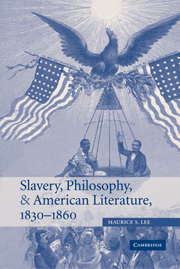Book contents
- Frontmatter
- Contents
- Acknowledgments
- Introduction
- 1 Absolute Poe
- 2 “Lord, it's so hard to be good”: affect and agency in Stowe
- 3 Taking care of the philosophy: Douglass's commonsense
- 4 Melville and the state of war
- 5 Toward a transcendental politics: Emerson's second thoughts
- Epilogue: An unfinished and not unhappy ending
- Index
Epilogue: An unfinished and not unhappy ending
Published online by Cambridge University Press: 22 September 2009
- Frontmatter
- Contents
- Acknowledgments
- Introduction
- 1 Absolute Poe
- 2 “Lord, it's so hard to be good”: affect and agency in Stowe
- 3 Taking care of the philosophy: Douglass's commonsense
- 4 Melville and the state of war
- 5 Toward a transcendental politics: Emerson's second thoughts
- Epilogue: An unfinished and not unhappy ending
- Index
Summary
This book ends with a bang, a whisper, and a box. The bang is the telos of the Civil War, which is often taken to mark an epistemic shift: rational deliberation gives way to violence, arguments from design to Darwinism, romanticism to literary realism, foundational metaphysics to pluralistic pragmatism. One reason why the war makes so strong a climax is that thinkers of the time portrayed it as such. Douglass called the War the “inevitable result of a long and persistent course,” while James Russell Lowell saw the great conflict as a consummation after which Americans could only write from “the ashes of the burnt-out mind.” Most scholars agree with Henry James's assessment from 1879, “[T]he Civil War marks an era in the history of the American mind,” in part because it signaled what Louis Menand and George Frederickson call a “failure of ideas.”
However, the literature of slavery shows that ideas were failing before Fort Sumter and that as philosophy in the United States faltered antebellum writers dwelled more skeptically on slavery and the prospects of rational order. In this sense, they anticipated the Civil War and its challenge to intellectual legacies, for though they never formulated an explicitly pragmatist or post-metaphysical worldview, they discerned in the debacle of the slavery crisis and its intimations of war the exhaustion of philosophical systems in what seemed their final throes.
- Type
- Chapter
- Information
- Slavery, Philosophy, and American Literature, 1830–1860 , pp. 210 - 216Publisher: Cambridge University PressPrint publication year: 2005

